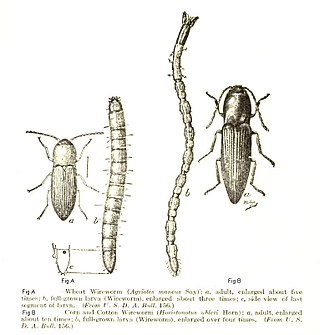
In Greek mythology, Polynices was the son of Oedipus and either Jocasta or Euryganeia and the older brother of Eteocles. When Oedipus was discovered to have killed his father and married his mother, Oedipus was expelled from Thebes, leaving Eteocles and Polynices to rule. Because of a curse put on them by their father, the two sons did not share the rule peacefully. During a battle for control over Thebes, the brothers killed each other.
In Greek mythology, Adrastus or Adrestus, , was a king of Argos, and leader of the Seven against Thebes. He was the son of the Argive king Talaus, but was forced out of Argos by his dynastic rival Amphiaraus. He fled to Sicyon, where he became king. Later he reconciled with Amphiaraus and returned to Argos as its king.
Tydeus was an Aetolian hero in Greek mythology, belonging to the generation before the Trojan War. He was one of the Seven against Thebes, and the father of Diomedes, who is frequently known by the patronymic Tydides.

Elateridae or click beetles are a family of beetles. Other names include elaters, snapping beetles, spring beetles or skipjacks. This family was defined by William Elford Leach (1790–1836) in 1815. They are a cosmopolitan beetle family characterized by the unusual click mechanism they possess. There are a few other families of Elateroidea in which a few members have the same mechanism, but most elaterid subfamilies can click. A spine on the prosternum can be snapped into a corresponding notch on the mesosternum, producing a violent "click" that can bounce the beetle into the air. Clicking is mainly used to avoid predation, although it is also useful when the beetle is on its back and needs to right itself. There are about 9300 known species worldwide, and 965 valid species in North America.

The Seven against Thebes were seven champions in Greek mythology who made war on Thebes. They were chosen by Adrastus, the king of Argos, to be the captains of an Argive army whose purpose was to restore Oedipus' son Polynices to the Theban throne. Adrastus, although always the leader of the expedition against Thebes, was not always counted as one of the Seven champions. Usually the Seven were Polynices, Tydeus, Amphiaraus, Capaneus, Parthenopaeus, Hippomedon, and Adrastus or Eteoclus, whenever Adrastus is excluded. They tried and failed to take Thebes, and all but Adrastus died in the attempt.

The Suppliants, also called The Suppliant Women, first performed in 423 BC, is an ancient Greek play by Euripides.
"The Greatest Asset" is a science fiction short story by American writer Isaac Asimov. It was written as a counterpoint to his story "2430 A.D." with the intention of refuting, rather than illustrating, the same quotation by writer and social commentator J. B. Priestley from his 1957 book Thoughts in the Wilderness. It was published in the January 1972 issue of Analog and reprinted in the 1975 collection Buy Jupiter and Other Stories.
In Greek mythology, Arion or Areion, is a divinely-bred, fabulously fast, black-maned horse. He saved the life of Adrastus, king of Argos, during the war of the Seven against Thebes.
Adrastus was a legendary king of Argos.

Adrastus was the son of Gordias, king of Phrygia. He features prominently in Herodotus's story of King Croesus of Lydia. Adrastus killed his brother, unwittingly, and was driven out by his father. In Sardis, he obtained purification (catharsis) from Croesus, and was accepted as a guest in the palace.
Adrastus of Aphrodisias was a Peripatetic philosopher who lived in the first half of the 2nd century AD.
Antigona (Antigone) is an opera in three acts in Italian by the composer Tommaso Traetta. The libretto, by Marco Coltellini, is based on the tragedy Antigone by Sophocles.
In Greek mythology Adrastus or Adrestus, , usually refers to:

Hyarotis is a genus of grass skippers in the family Hesperiidae.It is found in the Indomalayan realm
Papyrus Oxyrhynchus 124 is a student's composition, written in Greek and discovered in Oxyrhynchus. The manuscript was written on papyrus in the form of a sheet. The document was written in the 3rd century. Currently it is housed in the library of Winchester College in Winchester.

Papilio inopinatus is a species of swallowtail butterfly from the genus Papilio that is found in Romang, Babar, Damar and Tanimbar.

Adrastus rachifer is a species of beetle in the family Elateridae and the genus Adrastus.

Adrastus pallens is a species of click beetles native to Europe.
Codon is a genus of planthoppers in the family Fulgoridae, subfamily Stronglyodematinae. Species occur in South Africa.








